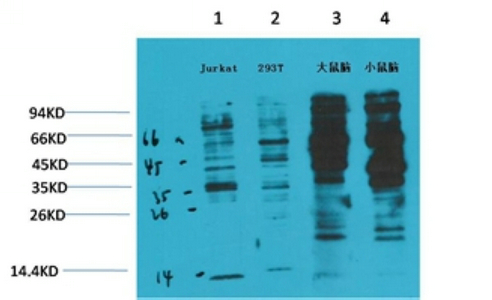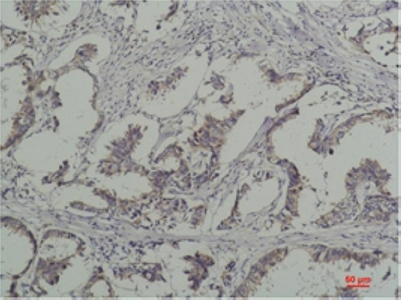

| WB | 咨询技术 | Transfected |
| IF | 咨询技术 | Transfected |
| IHC | 1/50-1/100 | Transfected |
| ICC | 技术咨询 | Transfected |
| FCM | 咨询技术 | Transfected |
| Elisa | 咨询技术 | Transfected |
| Aliases | Phospho-Tyrosine |
| clone | 8B2 |
| WB Predicted band size | Refer to figures |
| Host/Isotype | Mouse IgG1 |
| Antibody Type | Primary antibody |
| Storage | Store at 4°C short term. Aliquot and store at -20°C long term. Avoid freeze/thaw cycles. |
| Species Reactivity | Transfected |
| Immunogen | Purified Protein |
| Formulation | Purified antibody in PBS with 0.05% sodium azide,0.5%BSA and 50% glycerol. |
+ +
以下是关于Phospho-Tyrosine抗体的3-4篇参考文献,按文献名称、作者和摘要内容分类整理:
---
1. **文献名称**:*"Production of antibodies to phosphotyrosine and their use for affinity purification of phosphorylated proteins"*
**作者**:Gill, G.N., et al.
**摘要**:该研究首次报道了多克隆抗磷酸酪氨酸抗体的制备,并利用这些抗体从病毒转化细胞中分离出磷酸化酪氨酸蛋白(如src激酶底物),为后续信号转导研究提供了关键工具。
2. **文献名称**:*"Identification of multiple phosphorylated tyrosine residues in polyomavirus middle tumor antigen by monoclonal antibodies"*
**作者**:Kamps, M.P., Sefton, B.M.
**摘要**:研究者开发了单克隆抗磷酸酪氨酸抗体,成功检测到多瘤病毒中T抗原的酪氨酸磷酸化位点,验证了抗体在致癌蛋白磷酸化分析中的高特异性和应用潜力。
3. **文献名称**:*"Structural and mechanistic insights into tyrosine kinase activation"*
**作者**:Hubbard, S.R., Till, J.H.
**摘要**:这篇综述总结了抗磷酸酪氨酸抗体在研究酪氨酸激酶激活机制中的作用,尤其是在解析受体酪氨酸激酶(如EGFR)的磷酸化状态及信号传递中的关键应用。
4. **文献名称**:*"Antibody-based detection of protein phosphorylation states to guide cancer therapy"*
**作者**:Blanquin, C., et al.
**摘要**:研究探讨了抗磷酸酪氨酸抗体在癌症治疗中的应用,例如通过检测PD-1/PD-L1通路的磷酸化状态指导免疫检查点抑制剂的开发,凸显其临床转化价值。
---
以上文献涵盖了抗体的开发、验证及在基础研究与临床中的应用,反映了Phospho-Tyrosine抗体在信号转导和疾病机制研究中的重要性。
Phospho-tyrosine (pTyr) antibodies are essential tools in molecular and cellular biology for studying protein tyrosine phosphorylation, a critical post-translational modification regulating signal transduction pathways. Tyrosine phosphorylation, mediated by kinases and reversed by phosphatases, controls diverse cellular processes such as proliferation, differentiation, and apoptosis. Dysregulation of this process is implicated in cancers, immune disorders, and neurodegenerative diseases.
The development of pTyr antibodies in the 1980s revolutionized research by enabling specific detection of phosphorylated tyrosine residues. These antibodies are typically generated by immunizing animals with phosphorylated tyrosine-containing peptides or proteins, followed by hybridoma (monoclonal) or serum-based (polyclonal) production. Monoclonal antibodies (e.g., clone 4G10. PY20) are widely used due to their high specificity.
pTyr antibodies are employed in techniques like Western blotting, immunoprecipitation, and immunofluorescence to map phosphorylation events, identify signaling intermediates, and assess kinase/phosphatase activity. They have been pivotal in characterizing oncogenic tyrosine kinases (e.g., EGFR, BCR-ABL) and validating therapeutic targets. However, challenges remain, including cross-reactivity with non-target phospho-epitopes and variability due to phosphorylation dynamics.
Their applications extend to drug discovery, biomarker validation, and diagnostics, particularly in cancer (e.g., HER2/neu testing). Ongoing advancements in antibody engineering and phosphoproteomics continue to enhance their specificity and utility in decoding complex signaling networks.
×